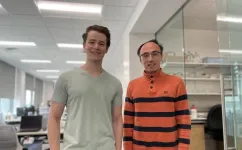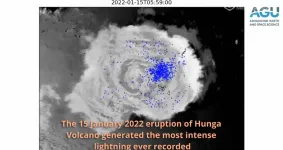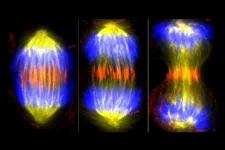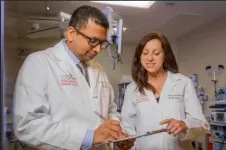(Press-News.org) RIVERSIDE, Calif. -- Alternative splicing, a clever way a cell generates many different variations of messenger RNAs — single-stranded RNAs involved in protein synthesis — and proteins from the same stretch of DNA, plays an important role in molecular biology. Progressing rapidly, the field of alternative splicing is a complex topic and the scientific literature on it is already extensive.
David Nikom, a student in the UC Riverside Neuroscience Graduate Program, and his advisor, Sika Zheng, an associate professor of biomedical sciences in the UCR School of Medicine and director of the Center for RNA Biology and Medicine, have written a review in Nature Reviews Neuroscience to discuss emerging research and evidence of the roles of alternative splicing defects in major neurodegenerative diseases. They also summarize the latest advances in RNA-based therapeutic strategies to target these disorders.
According to them, the topic of alternative splicing in neurodegenerative disease is particularly relevant in view of the increasing frequency of neurodegenerative disease worldwide and the urgent need for novel approaches for their treatment and management. They argue that since aberrant splicing dysregulation occurs commonly in neurodegenerative disease, the promise of using RNA therapies is important to understand and well-suited for a review.
Titled “Alternative Splicing in Neurodegenerative Disease and the Promise of RNA Therapies,” their review aims at providing comprehensive, all-inclusive knowledge for a scientific audience interested in the topic. It synthesizes knowledge and discoveries from decades of research made by many labs worldwide on Alzheimer’s disease, Parkinson’s disease, Huntington’s disease, ALS, frontal temporal dementia, etc. The work is supported by grants to Zheng from the National Institutes of Health. In the following Q&A, Zheng and Nikom unpack key aspects of the review.
Q: What is alternative splicing dysregulation?
Once the DNA of a gene is transcribed into a pre-messenger RNA (RNA before it is spliced), only a small fraction of the pre-messenger RNA makes into the final messenger RNA, or mRNA, transcript that encodes protein. Alternative splicing is a process by which a cell can select which of those protein-coding parts to include in the resulting RNA or protein. Alternative splicing dysregulation is when this process goes wrong in some way. The cell chooses to include the wrong protein-coding parts or exclude some correct parts. This can cause all sorts of problems with the resulting protein: it could be shorter than it is supposed to be which would disrupt its normal function in the cell, or it could result in the protein not being produced at all.
Q: What role does alternative splicing play in molecular biology?
Alternative splicing greatly expands the diversity of the proteins that can be made from a single gene. This is important because multicellular organisms make so many different types of cells that compose the diverse tissue types of their body. But each cell only has the same genetic code. To produce the dazzling complexity of multicellular life, cells depend on alternative splicing to give them the flexibility to make large families of similar proteins with different tissue-specific and developmental stage-specific functions. For example, certain alternative splicing networks are only activated during embryonic development and get shut down when the organism matures.
Q: Briefly, how does it contribute to the molecular pathology of a wide range of neurodegenerative diseases?
Certain organs rely on alternative splicing to generate cellular diversity more than others. We don’t know why for sure, but the brain has more alternative splicing going on than any other organ in the body. Scientists speculate this might be due to the brain’s unique complexity, rapid evolution, or the extraordinary diversity of cell types it contains. What we do know is that there are a lot of brain-specific alternative splicing events that consistently go wrong in neurological diseases. These include neurodevelopmental disorders, like autism spectrum disorder, or neurodegenerative diseases, like Alzheimer's Disease or ALS. The best understood example we have so far has to do with dysregulated alternative splicing in ALS. Scientists found these erroneous splicing events lead to production of aberrant proteins or reduction of normal proteins, which ultimately affect neuronal health and function. Some other neurodegenerative diseases with dysregulated alternative splicing include frontotemporal dementia, Parkinson’s disease, Familial dysautonomia, Huntington's disease, spinal muscular atrophy, and Duchenne muscular dystrophy.
Q: Does alternative splicing play a role in other diseases?
Alternative splicing has been linked to about 15% of human genetic diseases and cancers. Mutations in the components that regulate alternative splicing are causative for many diseases, both common and rare. Myotonic dystrophy, myelodysplastic syndromes (bone marrow cancers), retinal degenerative disorders like retinitis pigmentosa, and progeria (rare premature aging syndrome) are prominent examples of diseases caused by splicing defects.
Q: You conclude the review with the latest advances in RNA-based therapeutic strategies developed to target the underlying splicing mechanisms. What are some of these advances?
A good example of targeting underlying splicing mechanisms to treat diseases is with a disease called spinal muscular atrophy, a major genetic disease of children and infants. Humans carry two near identical copies of the Survival Motor Neuron gene: SMN1 and SMN2 which are essential for the survival of all animal cells. Patients with Spinal Muscular Atrophy have loss of SMN1; SMN2 is the only source of the SMN protein in patients. The critical difference between SMN1 and SMN2 is splicing of exon 7, a small fragment of protein-coding sequence within the SMN gene. Unlike SMN1 exon 7, SMN2 exon 7 is usually not included in most tissues. The exon 7-skipped transcript generated by SMN2 produces a partially functional and unstable protein. The first therapeutic approval for SMA targets the SMN2 pre-mRNA and binds to a region that is accessed by the splicing machinery to remove exon 7. This ultimately leads to blocking of the removal of exon 7 and promotes the formation of functional SMN protein. By promoting splicing of exon 7, this drug (Spinraza) increased SMN expression in the cell from the SMN2 gene, compensating for the loss of SMN1, and preventing the loss of cells in the central nervous system.
This story is a textbook example of a splicing mechanism that can be targeted to treat an otherwise fatal disease in children. The hope is to understand many more splicing mechanisms and find new ways to target them to treat other diseases.
Some of the latest advances:
Splice-switching oligonucleotides (like Spinraza) for tauopathies — neurodegenerative disorders with abnormal tau protein deposition — that can correct the balance of disease-causing isoforms (tau-RNA variants) in the brain
Splice-splicing oligonucleotides targeting amyloid proteins that can reduce brain plaques in Alzheimer’s mice
Spliceosome-mediated RNA trans-splicing (SMaRT) - gene reprogramming system designed to correct aberrantly spliced mRNAs by replacing the entire coding sequence upstream or downstream of a splice site
RNA-targeted CRISPR approaches that can reverse splicing defects without altering the patient’s genome like traditional gene therapies.
The University of California, Riverside is a doctoral research university, a living laboratory for groundbreaking exploration of issues critical to Inland Southern California, the state and communities around the world. Reflecting California's diverse culture, UCR's enrollment is more than 26,000 students. The campus opened a medical school in 2013 and has reached the heart of the Coachella Valley by way of the UCR Palm Desert Center. The campus has an annual impact of more than $2.7 billion on the U.S. economy. To learn more, visit www.ucr.edu.
END
What role does alternative splicing play in neurodegenerative disease?
UC Riverside scientists David Nikom and Sika Zheng explain in a timely review
2023-06-20
ELSE PRESS RELEASES FROM THIS DATE:
Tonga’s Hunga eruption produced the most intense lightning ever recorded
2023-06-20
American Geophysical Union
Release No. 23-26
20 June 2023
For Immediate Release
This press release and accompanying multimedia are available here: https://news.agu.org/press-release/tongas-hunga-eruption-produced-the-most-intense-lightning-ever-recorded/
Additional study highlights:
The 15 January eruption lasted at least 11 hours, several hours longer than previously known
The plume produced the highest-altitude lightning flashes ever measured, 20 to 30 kilometers (12 to 19 miles) above sea level
Lightning “surfed” giant waves that rippled through volcanic plume
Lightning data ...
Rensselaer researcher to investigate the mechanics of mitosis to combat cancer
2023-06-20
It is a scary fact that one in two women and one in three men in the United States will develop some form of cancer in their lifetime. One of the hallmarks of many cancers is the occurrence of errors during the cell division process called mitosis. Therefore, critical to enhancing treatments or perhaps even finding a cure for cancer and other diseases, is developing a better understanding of how mitosis works in both healthy and diseased cells.
Rensselaer Polytechnic Institute’s Scott Forth, Ph.D., assistant professor of biological sciences ...
Mason College of Public Health researchers reveal how digital contact tracing applications can be utilized now that the pandemic is over
2023-06-20
During the pandemic, contact tracing apps kept Americans informed of potential exposure risk with the goal of reducing infections. But did apps like this help reduce the spread of COVID and how might we improve these apps for use in future outbreaks?
Contact tracing is a pivotal part of pandemic preparedness. Evidence-based research on best practices for contact tracing is important because when employed inefficiently contact tracing drains resources. Used effectively, contact tracing slows the spread of disease and saves lives. In the past, contact tracing was done through health ...
UNCG spin-off launches national study to help prevent opioid misuse
2023-06-20
Prevention Strategies received a grant from the National Institutes of Health to pursue the study and develop a commercially viable intervention tool based on prevention science. Known as WorkWell, it is a tailored mobile health app that represents the next generation of evidence-based, technology-aided intervention programs.
The initial pilot program to test the WorkWell app will focus on construction trade workers and nurses, as well as nursing assistants and technicians. These occupations have been disproportionately impacted by the opioid crisis and have high mortality ratios.
“Opioid-involved overdoses are among the leading causes of death in the United States despite extensive ...
UTHealth Houston study on repeated radiofrequency ablation in combination with chemotherapy for pancreatic cancer supported with $3.3M HHS grant
2023-06-20
A combination strategy of endoscopic ultrasound-guided radiofrequency ablation (EUS-RFA) with chemotherapy for pancreatic cancer will be studied at UTHealth Houston through a $3.3 million grant from the National Cancer Institute by the U.S. Department of Health and Human Services.
The survival rate of pancreatic adenocarcinoma, or pancreatic cancer, remains low, around 10%, because of its poor response to current chemotherapies.
The five-year grant will continue the established six-year clinical and translational research collaboration between Jennifer Bailey-Lundberg, ...
Breast cancer research team pulls in $3 million in national support
2023-06-20
UTHSC researchers working to find new treatments to combat breast cancer metastasis recently pulled in a major national award. Wei Li, PhD, distinguished professor of Pharmaceutical Sciences and director of the Drug Discovery Center in the College of Pharmacy, and Tiffany Seagroves, PhD, professor of Pathology in the College of Medicine, are principal investigators on a $3.07 million grant from the National Cancer Institute for a project to develop a new series of drugs targeting microtubules to stop the spread of breast cancer to the brain and bone. Duane Miller, PhD, professor emeritus, and Zhongzhi Wu, PhD, assistant professor, both in ...
Science in the shadows: NASA selects 5 experiments for 2024 total solar eclipse
2023-06-20
A total solar eclipse will darken a swath of North America as the Moon blocks the light of the Sun for a few minutes on April 8, 2024. In addition to casting a breathtaking, passing shadow over the heads of millions of people, this total solar eclipse gives scientists a unique opportunity to study the Sun, Earth, and their interactions.
NASA will fund five interdisciplinary science projects for the 2024 eclipse to make the most of this opportunity. The projects, which are led by researchers at different academic institutions, will study the Sun and its influence on Earth with a variety of instruments, including cameras aboard high-altitude research planes, ham radios, and ...
Dupilumab lessens disease in COPD patients with type 2 inflammation
2023-06-20
BIRMINGHAM, Ala. – Chronic obstructive pulmonary disease patients with type 2 inflammation saw rapid and sustained improvements in their disease after treatment with the monoclonal antibody dupilumab, according to a yearlong, Phase 3 clinical trial reported in the New England Journal of Medicine.
These improvements — as measured by a significantly lower annualized rate of acute exacerbations, significantly better lung function and quality of life, and significantly less severe symptoms than placebo-treated adults with COPD — were observed within two to four weeks after the initiation of dupilumab and were sustained throughout the 52-week trial period. This monoclonal antibody ...
Scientists discover new embryonic cell type that self-destructs to protect the developing embryo
2023-06-20
Scientists studying gene activity data of the early human embryo have discovered an overlooked type of cell which self-destructs within days of forming, as part of a quality control process to protect the developing foetus. The findings give insights on what happens at the very first stages of life after fertilisation which could in the future help improve IVF or regenerative medicine treatments.
A new study published on 20 June 2023 in PLoS Biology by an international team of scientists including researchers at the University of Bath, finds that our earliest development in the womb may be rather different to what we have always assumed.
While ...
National Geographic Explorers win award for visualizing arctic climate change
2023-06-20
FOR IMMEDIATE RELEASE: June 20, 2023 - Washington, D.C. - An innovative virtual reality project created by National Geographic Explorers in collaboration with local communities was recognized with the “Best in Category: Visualize” during the XR Prize Challenge: Fight Climate Change earlier this month. The project, “Qikiqtaruk: Arctic at Risk” was selected for the award from across 150 submissions at the Augmented World Expo (AWE) in Santa Clara, California on June 1, 2023.
“Qikiqtaruk: Arctic at Risk” brought together researchers, park rangers, educators and immersive content ...
LAST 30 PRESS RELEASES:
Highly stable self-rectifying memristor arrays: Enabling reliable neuromorphic computing via multi-state regulation
Composite superionic electrolytes for pressure-less solid-state batteries achieved by continuously perpendicularly aligned 2D pathways
Exploring why some people may prefer alcohol over other rewards
How expectations about artificial sweeteners may affect their taste
Ultrasound AI receives FDA De Novo clearance for delivery date AI technology
Amino acid residue-driven nanoparticle targeting of protein cavities beyond size complementarity
New AI algorithm enables scientific monitoring of "blue tears"
Insufficient sleep among US adolescents across behavioral risk groups
Long COVID and recovery among US adults
Trends in poverty and birth outcomes in the US
Heterogeneity of treatment effects of GLP-1 RAs for weight loss in adults
Within-person association between daily screen use and sleep in youth
Low-dose lithium for mild cognitive impairment
Catheter ablation and oral anticoagulation for secondary stroke prevention in atrial fibrillation
A new theory of brain development
Pilot clinical trial suggests low dose lithium may slow verbal memory decline
Bioprinting muscle that knows how to align its cells just as in the human body
A hair-thin fiber can read the chemistry of a single drop of body fluid
SwRI develops magnetostrictive probe for safer, more cost-effective storage tank inspections
National report supports measurement innovation to aid commercial fusion energy and enable new plasma technologies
Mount Sinai, Uniformed Services University join forces to predict and prevent diseases before they start
Science of fitting in: Do best friends or popular peers shape teen behavior?
USF study: Gag grouper are overfished in the Gulf; this new tool could help
New study from Jeonbuk National University finds current climate pledges may miss Paris targets
Theoretical principles of band structure manipulation in strongly correlated insulators with spin and charge perturbations
A CNIC study shows that the heart can be protected during chemotherapy without reducing antitumor efficacy
Mayo Clinic study finds single dose of non-prescribed Adderall raises blood pressure and heart rate in healthy young adults
Engineered immune cells show promise against brain metastases in preclinical study
Improved EV battery technology will outmatch degradation from climate change
AI cancer tools risk “shortcut learning” rather than detecting true biology
[Press-News.org] What role does alternative splicing play in neurodegenerative disease?UC Riverside scientists David Nikom and Sika Zheng explain in a timely review









